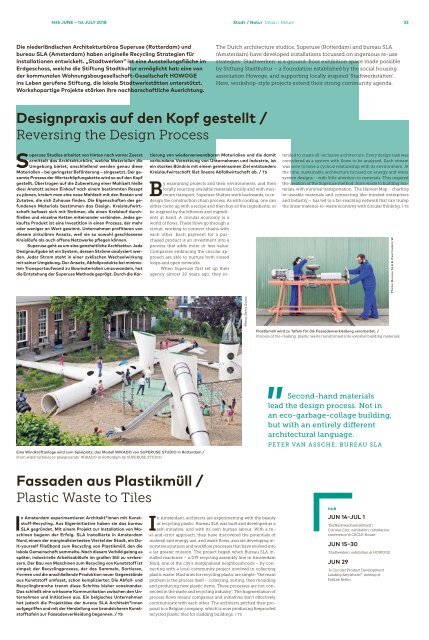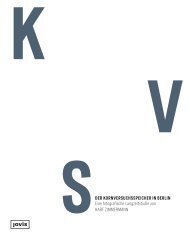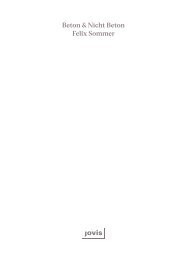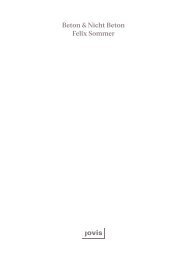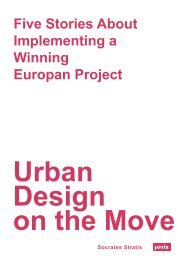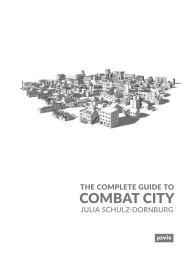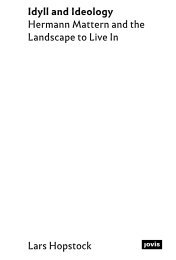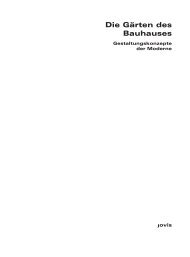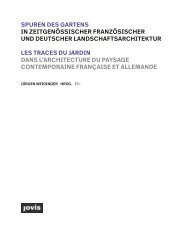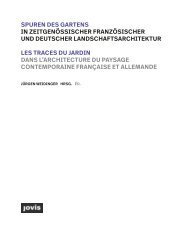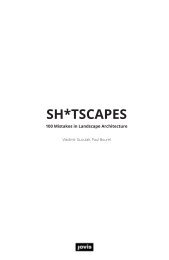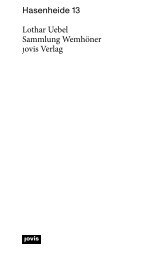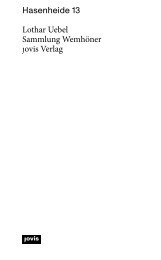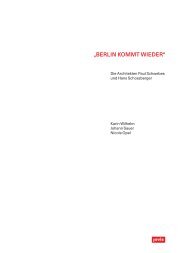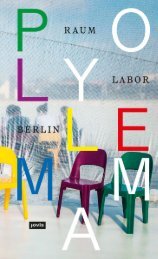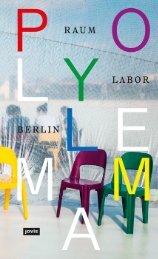Make City 2018 Festival - Newspaper
Create successful ePaper yourself
Turn your PDF publications into a flip-book with our unique Google optimized e-Paper software.
14th JUNE – 1st JULY <strong>2018</strong> Stadt / Natur Urban / Nature<br />
33<br />
Die niederländischen Architekturbüros Superuse (Rotterdam) und<br />
bureau SLA (Amsterdam) haben originelle Recycling Strategien für<br />
Installationen entwickelt. „Stadtwerken“ ist eine Ausstellungsfläche im<br />
Erdgeschoss, welche die Stiftung Stadtkultur ermöglicht hat: eine von<br />
der kommunalen Wohnungsbaugesellschaft-Gesellschaft HOWOGE<br />
ins Leben gerufene Stiftung, die lokale Stadtwerkstätten unterstützt.<br />
Workshopartige Projekte stärken ihre nachbarschaftliche Ausrichtung.<br />
The Dutch architecture studios, Superuse (Rotterdam) and bureau SLA<br />
(Amsterdam) have developed installations focussed on ingenious re-use<br />
strategies: 'Stadtwerken' is a ground-floor exhibition space made possible<br />
by Stiftung Stadtkultur – a Foundation established by the social housing<br />
association Howoge, and supporting locally inspired 'Stadtwerkstätten'.<br />
Here, workshop-style projects extend their strong community agenda.<br />
Designpraxis auf den Kopf gestellt /<br />
Reversing the Design Process<br />
Superuse Studios arbeitet von hinten nach vorne: Zuerst<br />
ermittelt das Architekturbüro, welche Materialien die<br />
Umgebung bietet, anschließend werden genau diese<br />
Materialien – bei geringster Beförderung – eingesetzt. Der gesamte<br />
Prozess der Wertschöpfungskette wird so auf den Kopf<br />
gestellt. Übertragen auf die Zubereitung einer Mahlzeit hieße<br />
dies: Anstatt seinen Einkauf nach einem bestimmten Rezept<br />
zu planen, kreiert man eine neue Mahlzeit mit den Resten und<br />
Zutaten, die sich Zuhause finden. Die Eigenschaften des gefundenen<br />
Materials bestimmen das Design. Kreislaufwirtschaft<br />
befasst sich mit Strömen, die einen Kreislauf durchfließen<br />
und einzelne Ketten miteinander verbinden. Jedes gekaufte<br />
Produkt ist eine Investition in einen Prozess, der mehr<br />
oder weniger an Wert gewinnt. Unternehmen profitieren von<br />
diesem zirkulären Ansatz, weil sie so sowohl geschlossene<br />
Kreisläufe als auch offene Netzwerke pflegen können.<br />
Superuse geht es um eine ganzheitliche Architektur. Jede<br />
Designaufgabe ist ein System, dessen Ströme analysiert werden.<br />
Jeder Strom steht in einer zyklischen Wechselwirkung<br />
mit seiner Umgebung. Der Ansatz, Abfallprodukte bei minimalem<br />
Transportaufwand zu Baumaterialien umzuwandeln, hat<br />
die Entstehung der Superuse Methode geprägt. Durch die Kar-<br />
tierung von wiederverwendbaren Materialien und die damit<br />
verbundene Vernetzung von Unternehmen und Industrie, ist<br />
ein starkes Bündnis mit einem gemeinsamen Ziel entstanden:<br />
Kreislaufwirtschaft löst lineare Abfallwirtschaft ab. / TS<br />
By examining projects and their environments, and then<br />
locally sourcing available materials locally and with minimum<br />
transport, Superuse Studios work backwards, to redesign<br />
the construction chain process. As with cooking, one can<br />
either come up with a recipe and then buy all the ingredients, or<br />
be inspired by the leftovers and ingredients<br />
at hand. A circular economy is a<br />
world of flows. These flows go through a<br />
circuit, working to connect chains with<br />
each other. Each payment for a purchased<br />
product is an investment into a<br />
process that adds more or less value.<br />
Companies embracing the circular approach<br />
are able to nurture both closed<br />
loops and open networks.<br />
When Superuse first set up their<br />
agency almost 20 years ago, they intended<br />
to create all-inclusive architecture. Every design task was<br />
considered as a system with flows to be analysed. Each stream<br />
was seen to have a cyclical relationship with its environment. At<br />
the time, sustainable architecture focused on energy and water<br />
system designs – with little attention to materials. This inspired<br />
the creation of the Superuse method: from waste to building materials,<br />
with minimal transportation. The Harvest Map – charting<br />
re-useable materials and connecting like-minded enterprises<br />
and industry – has led to a far-reaching network that can trump<br />
the linear material-to-waste economy with circular thinking. / TS<br />
Photo: Bureau SLA & Overtreders W<br />
Photo: Denis Guzzo<br />
Plastikmüll wird zu Tafeln für die Fassadenverkleidung verarbeitet. /<br />
Process of tile-making: plastic waste transformed into external building materials.<br />
Eine Windkraftanlage wird zum Spielplatz: das Modell WIKADO von SUPERUSE STUDIO in Rotterdam /<br />
From wind turbines to playgrounds: WIKADO in Rotterdam by SUPERUSE STUDIO<br />
Second-hand materials<br />
lead the design process. Not in<br />
an eco-garbage-collage building,<br />
but with an entirely different<br />
architectural language.<br />
PETER VAN ASSCHE, BUREAU SLA<br />
Fassaden aus Plastikmüll /<br />
Plastic Waste to Tiles<br />
In Amsterdam experimentieren Architekt*innen mit Kunststoff-Recycling.<br />
Aus Eigeninitiative haben sie das bureau<br />
SLA gegründet. Mit einem Projekt zur Installation von Maschinen<br />
begann der Erfolg. SLA installierte in Amsterdam<br />
Nord, einem der marginalisiertesten Viertel der Stadt, ein Do-<br />
It-yourself Fließband zum Recycling von Plastikmüll, den die<br />
lokale Gemeinschaft sammelte. Nach diesem Vorbild gelang es<br />
später, industrielle Arbeitsabläufe im großen Stil zu verbessern.<br />
Der Bau von Maschinen zum Recycling von Kunststoff ist<br />
simpel; der Recyclingprozess, der das Sammeln, Sortieren,<br />
Formen und die anschließende Produktion neuer Gegenstände<br />
aus Kunststoff umfasst, schon komplizierter. Die Abfall- und<br />
Recyclingbranche trennt diese Schritte bisher voneinander.<br />
Das schließt eine wirksame Kommunikation zwischen den Unternehmen<br />
und Initiativen aus. Ein belgisches Unternehmen<br />
hat jedoch die Projektidee der bureau SLA Architekt*innen<br />
aufgegriffen und mit der Herstellung von brandsicheren Kunststofftafeln<br />
zur Fassadenverkleidung begonnen. / TS<br />
In Amsterdam, architects are experimenting with the beauty<br />
of recycling plastic. Bureau SLA was built and developed as a<br />
self-initiative, and with its own human labour. With a trial-and-error<br />
approach, they have discovered the potentials of<br />
material and energy use, and waste flows, and are developing innovative<br />
solutions and workflow processes that have evolved into<br />
a far greater mission. The project began when Bureau SLA installed<br />
machines – a DIY recycling assembly line in Amsterdam<br />
Nord, one of the city’s marginalised neighbourhoods – by connecting<br />
with a local community project involved in collecting<br />
plastic waste. Machines for recycling plastic are simple: “the main<br />
problem is the process itself – collecting, sorting, then moulding<br />
and producing new plastic items. These processes are not connected<br />
in the waste and recycling industry”. The fragmentation of<br />
process flows means companies and initiatives don’t effectively<br />
communicate with each other. The architects pitched their proposal<br />
to a Belgian company, which is now producing fireproofed<br />
recycled plastic tiles for cladding buildings. / TS<br />
HUB<br />
JUN 14–JUL 1<br />
‘DieNachwachsendeStadt /<br />
Circular <strong>City</strong>’, exhibition, installation,<br />
conference @ CRCLR House<br />
JUN 15–30<br />
‘Stadtwerken’ exhibition @ HOWOGE<br />
JUN 29<br />
‘Is Circular Product Development<br />
Leading Anywhere?’, meetup @<br />
FabLab Berlin


